Webinar agenda
Recordings are available for viewing in the EUPHA Resources Module. The module can be accessed through the link in your personal account. In the Module click on "EUPHA general resources" and proceed to the webinars folder.
Join the conversation with the Rural Health Promotion Research Working Group of the EUPHA Health Promotion Section
September 18, 2025 / 10:00-11:50 CEST
Organised by: Rural health promotion Group of the Health promotion Section
Moderated by Geir Arild Espnes, NTNU Center for Health Promotion Research
Click here to register.
Trends in alcohol-related hospitalizations, deaths and consumption patterns in Ireland pre-minimum unit pricing phase
October 30, 2025 / 16:00-17:00 CEST
Organised by: EUPHA Chronic diseases section
Speakers: Ms Isabelle Mary Kate Coonan and Dr. Zubair Kabir, University College Cork, Ireland
Click here to register.
Past webinars
The Italian Fund for Alzheimers and Dementia: the public health response to dementia in Italy
June 26, 2025 / 16:00-17:00 CEST
Organised by: EUPHA Chronic diseases section
Speakers: Domitilla Marconi MD, University of Siena, Italy
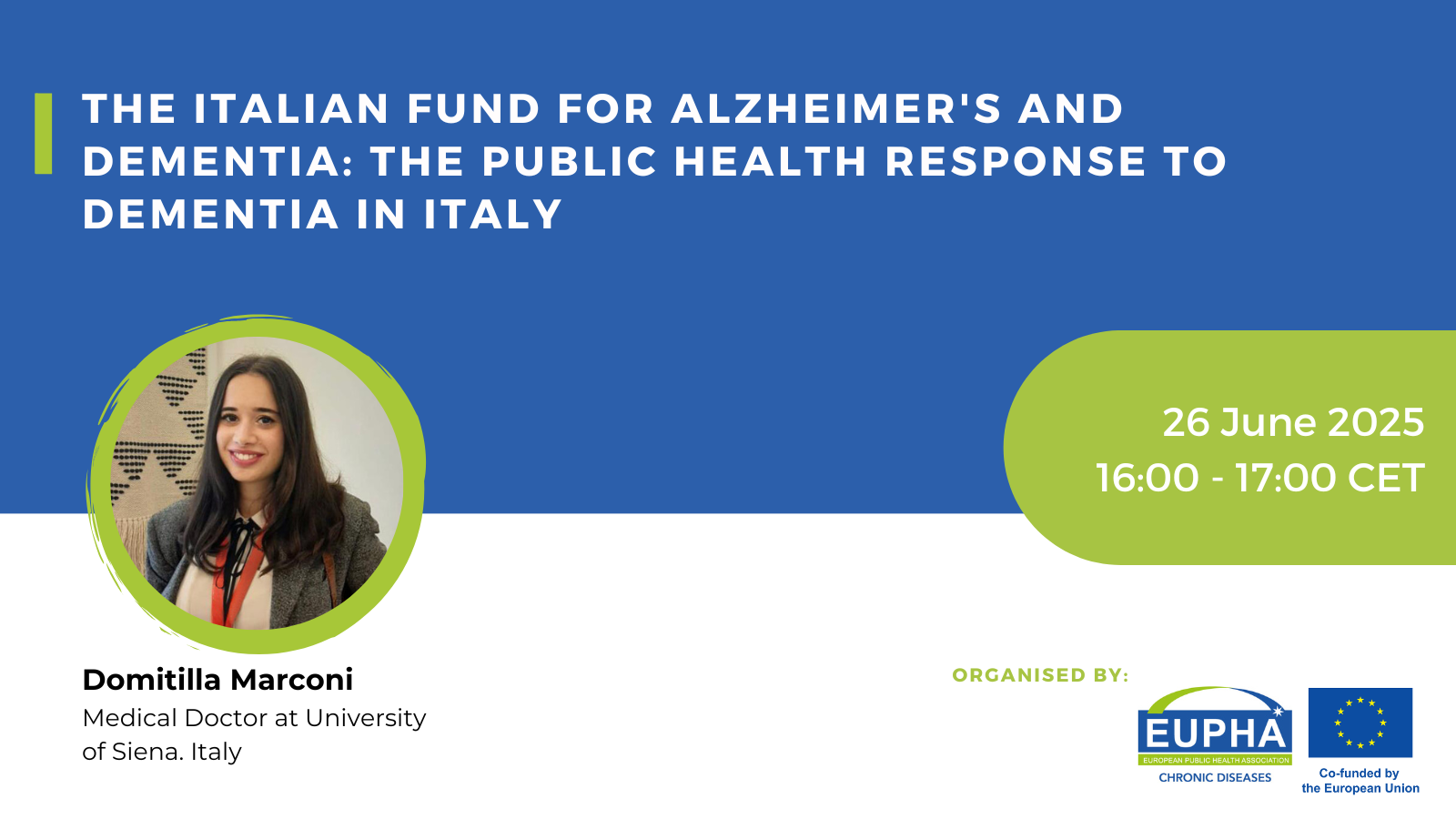
The Italian Fund for Alzheimer's and Dementia: the public health response to dementia in Italy
Dementia is a leading cause of disability globally. As endorsed by the World Health Organization (WHO), and in particular in the Global Action Plan on dementia (GAP) - launched in 2017 - concrete public health actions should be adopted to reduce the burden of dementia. The Italian strategy for dementia started in 2014 by developing the first National Dementia Plan, which was later financially supported by a grant of 15 million euros for three years (2021-2023, The Italian Fund for Alzheimer's and Dementia (IFAD).
The activities presented outline the efforts and achievements of the Italian National Institutions, supported by regions and autonomous provinces, to promote a national public health response to dementia. (Project carried out with the technical and financial support of the Ministry of Health - Chapter 2302)
According to GAP action areas, Istituto Superiore di Sanità (ISS) activities conducted within the IFAD are described, covering governance, population, and individual levels.
A scenario analysis revealed that 39.5% of dementia cases can be attributed to 11 risk factors, and by reducing them by 20%, up to 67,000 can be prevented. A National Guideline was developed, consisting of 167 clinical and 39 research recommendations. An economic evaluation showed expenses of €23.5 billion. A national survey showed a median diagnostic delay of 12 months and average out-of-pocket costs of €1,800/month. Focus groups with carers identified unmet needs in health services and campaigns on inclusivity. A census of Dementia Friendly Communities identified 57, spread across North (77%), Centre (9%), and South (14%). Information on all Italian memory clinics, daycare centres, and nursing homes was collected and uploaded to a dedicated website.
Data on the epidemiology of dementia and its risk factors, and information on health services and inclusive communities should guide IFAD's future activities, refunded €35 million for 2024-2026. Geographic heterogeneity should be addressed to ensure equitable care.
Adopting the WHO Global Action Plan on Dementia as a common language to facilitate international communication, we described the Italian scenario aiming to promote a European strategy for the public health response to dementia, focusing on the harmonisation of best practices, coordination of research and innovation activities, and advocacy for dedicated science-for-policy initiatives.
Low-value cancer screening: less is more?
May 22, 2025 / 16:00-17:00 CEST
Organised by: EUPHA Chronic diseases section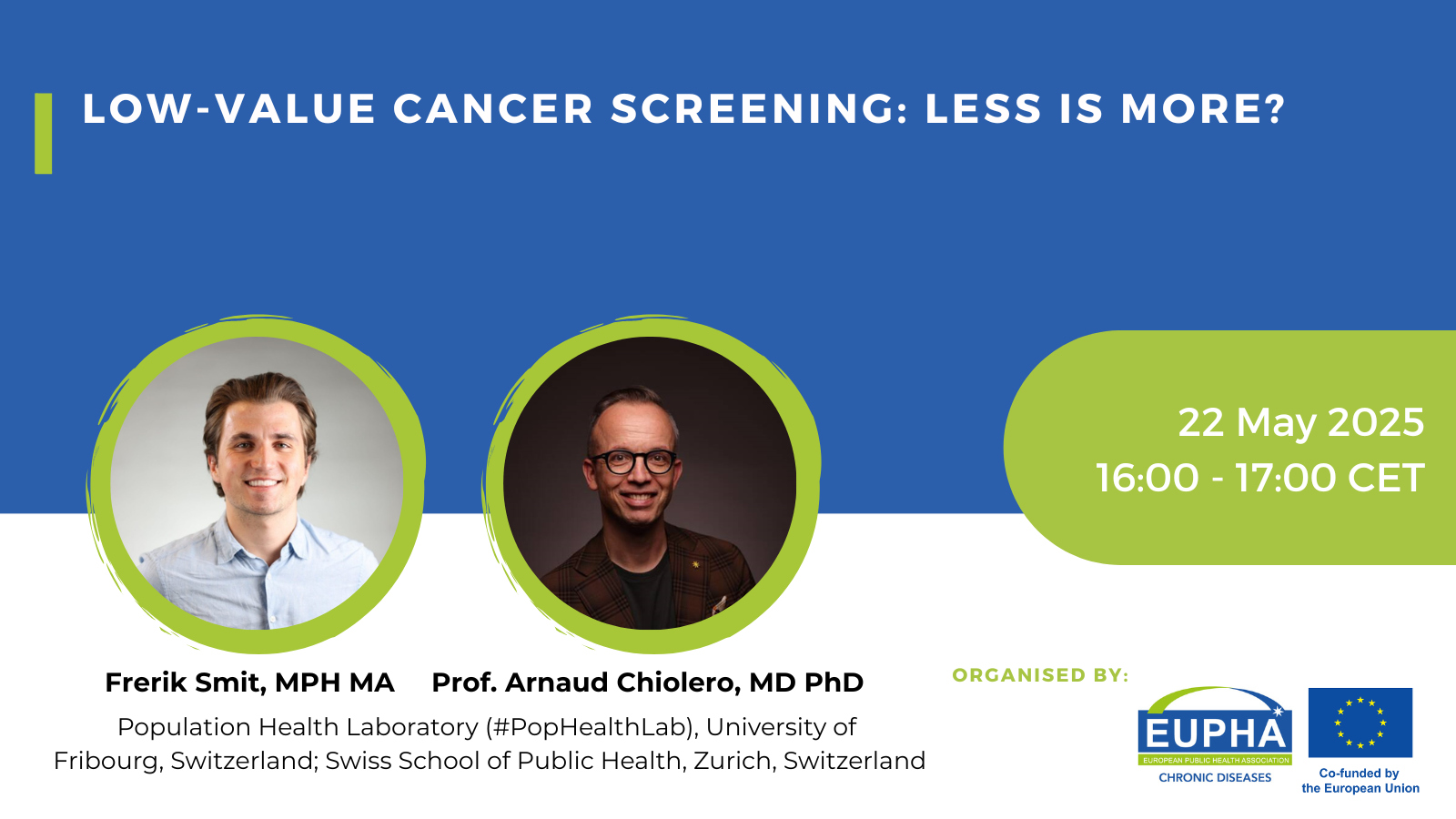
Summary: Evidence-based cancer screening guidelines, which are an important decision-making tool for guiding cancer screening practices, only recommend screening when existing evidence has shown the benefits of a specific test to outweigh its harms at a reasonable cost for specific groups in the population. Accordingly, screening that occurs outside of these recommendations can, by definition, be classified as a form of low-value care. However, individualised approaches to screening – which have notably grown in popularity – provide alternative frameworks by which to evaluate the value of cancer screening. In the case of older adults, these alternative approaches suggest that those in good overall health with a sufficient life expectancy may still benefit from specific types of screening. In this presentation, we will outline existing debates on cancer screening with a focus on what to do among older adults and discuss the results of our population-based research on cancer screening in Switzerland.
Frerik Smit, MPH MA, Population Health Laboratory (#PopHealthLab), University of Fribourg, Switzerland; Swiss School of Public Health, Zurich, Switzerland. Frerik Smit is a PhD student in epidemiology and research assistant at the Population Health Laboratory (#PopHealthLab), University of Fribourg and the Swiss School of Public Health.
Professor Arnaud Chiolero, MD PhD, Population Health Laboratory (#PopHealthLab), University of Fribourg, Switzerland; Swiss School of Public Health, Zurich, Switzerland. Arnaud Chiolero is Professor of population health at the University of Fribourg, director of the Population Health Laboratory (#PopHealthLab), and co-director of the Swiss School of Public Health.
Yogurt consumption is associated with poorer sleep outcomes cross-sectionally, but not long-term
April 24, 2025 / 16:00-17:00 CEST
Organised by: EUPHA Chronic diseases section
Speaker: Emma Guyonnet, MPH - Epidemiology Candidate, Columbia University Mailman School of Public Health
In this webinar, we will explore the findings from a recent study examining the association between dairy product consumption and sleep outcomes. The research, conducted with 37,396 adults from the NutriNet-Santé cohort, looked at both cross-sectional and longitudinal data to understand how dairy intake impacts sleep. The webinar will provide an in-depth discussion of these findings, including the possible reasons behind the associations and the implications for future dietary guidelines on sleep health. Participants will also have the opportunity to explore the potential need for clinical interventions to further understand these findings. Join us to learn more about this important intersection of diet and sleep health!
Using Co-design to reimagine the regulation of digital drug information infrastructures in the EU
April 4, 2025 / 11:00-12:00 CET
Organised by: EUPHA Foresight section
Speaker: Mathias Møllebæk (Copenhagen Centre for Regulatory Science)
In complex areas like healthcare, efforts to adapt new technologies often become constrained by path dependency, reinforcing existing frameworks and assumptions and limiting opportunities for innovation. To address these challenges, it is essential to move beyond existing constraints and adopt a more open-ended, "blue sky" approach that encourages exploration of alternative ways of framing issues and possibilities. Co-design is both a design and research method that uses collaborative engagement between designers and stakeholders to articulate different viewpoints on a single topic through design activities involving visual tools, such as sketches, prototypes, and diagrams. In this talk we show how we used co-design methodology with different experts to reframe discussions around the regulatory challenges of digitalizing drug safety information in the European Union.
Mathias Møllebæk (he/him) is a researcher at the Copenhagen Centre for Regulatory Science, University of Copenhagen, where he explores the intersection of digital health innovation and regulatory frameworks, European pharmaceutical governance and policy and regulatory theory. Recent work focuses on improving the communication of medicine safety, particularly through digital platforms.
Strengthening Public Health Advocacy: What can national public health associations and schools of public health do to counteract expressions of concern or calls for reevaluation of WHO Membership
April 2, 2025 / 11:00-12:00 CET
Organised by: EUPHA and ASPHER
Welcome and Introduction:
Avi Magid, ASPHER PH Emergencies Task Force
Henrique Barros, ASPHER President
Tit Albreht, EUPHA President
Country Perspectives:
Rebecca Ingenhoff, Germany
Dorit Nitzan, Israel
Walter Ricciardi, Italy
Oleg Lozan, Moldova
Rusłan Savchuk, Ukraine
Reflection from WHO Europe:
Natasha Azzopardi Muscat, Director Country Health Policies & Systems
Presentation of the report WHO's Role in a Changing World – Why It Still Matters, leading into a written guidance on advocacy
Ariane Bauernfeind, Andalusian School of Public Health, Spain
Alison McCallum, University of Edinburgh, United Kingdom
Closing reflections from WFPHA and GNAPH
Emma Rawson Te-Patu, WFPHA President
John Middleton, GNAPH President-elect
Wrap up and call for action
Avi Magid, ASPHER
Rehabilitation - the health strategy to deal with chronic diseases
March 20, 2025 / 16:00-17:00 CET
Organised by: EUPHA Chronic diseases section
Speaker: Roxanne Maritz, University of Lucerne, WHO CC for Rehabilitation in global Health Systems
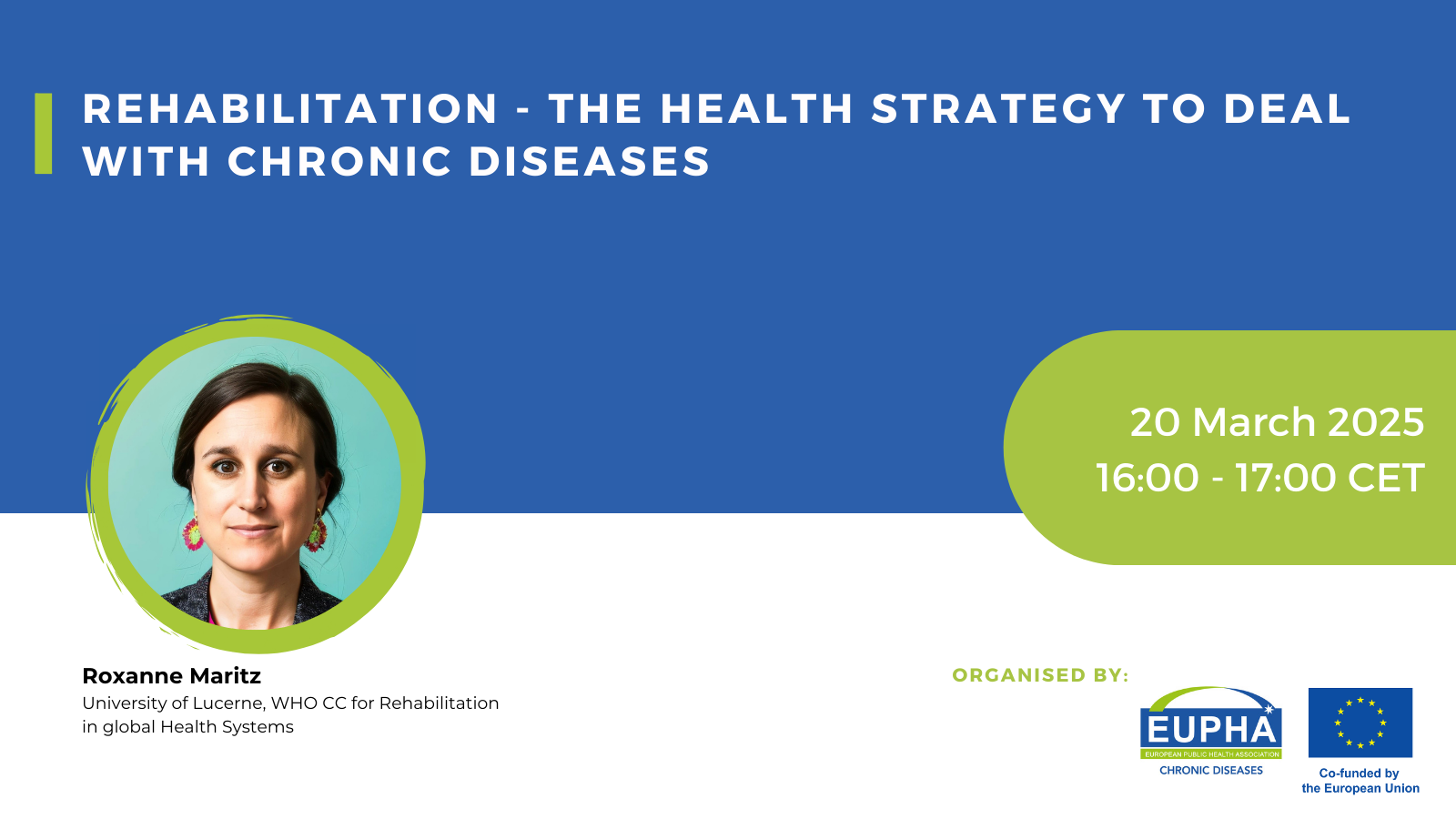
Chronic diseases such as cardiovascular diseases, diabetes, chronic respiratory diseases, and musculoskeletal disorders are among the leading causes of morbidity and disability worldwide. The Astana Declaration emphasizes the need for an integrated health approach that includes rehabilitation alongside prevention, treatment, and palliative care. Since chronic conditions often result in long-term impairments, rehabilitation is essential in supporting individuals to maintain independence, participate in society, and reduce long-term healthcare costs.
The WHO Rehabilitation 2030 initiative aligns with the Astana Declaration’s objectives by advocating for the systematic integration of rehabilitation into health systems as a response to the increasing burden of chronic diseases and aging populations. With over 2.4 billion people worldwide in need of rehabilitation, chronic diseases are a significant driver of this demand. Recognizing rehabilitation as a core health strategy is crucial to ensuring a holistic, people-centered approach to managing chronic conditions effectively.
5th inbetween conference seminar
March 11, 2025 / 13:00-15:00 CET
Organised by: EUPHA-Social security work and health section
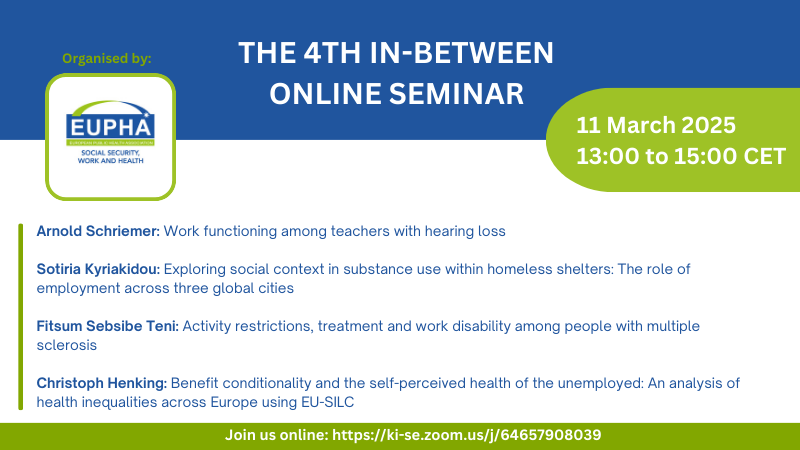
Stand up for Science - A Global Necessity
March 7, 2025 / 13:00-14:00 CET
Organised by: EUPHA
Scientific integrity is under threat worldwide, with growing risks to public health, research, and evidence-based decision-making. As attacks on science escalate, solidarity and action are crucial. These threats are not just local - they have global consequences. Europe has an opportunity to take a leadership role, providing a safe haven for scientific knowledge, skills, and resources at risk of being lost. This webinar is part of the global Stand Up for Science initiative, which emphasizes that science must remain independent, publicly funded, and free from political interference. Read more here.
Speakers:
- Charlotte Marchandise - Executive Director, EUPHA, NL
- Marleen Bekker, Associate Professor, Health Policy and Politics, Wageningen University, NL
- Scott Greer, Professor of Health Management and Policy, Global Public Health and Political Science, University of Michigan, USA -
- Kit Yates - Professor of Mathematical Biology and Public Engagement, University of Bath, UK
- Martin McKee, Professor of European Public Health, London School of Hygiene & Tropical Medicine, UK
Join us as we stand in solidarity with US health academics and public health institutions facing threats to scientific independence. We will explore how we can collectively strengthen safeguards for research, public health policies, and academic freedom in Europe and beyond.
From convenience to crisis: understanding the public health risks of ultra-processed foods
March 6, 2025 / 15:00-16:00 CET
Organised by: EUPHA Food and nutrition section
Speaker: Prof Carlos A. Monteiro, MD, PhD
Moderators: Dr. Marialaura Bonaccio PhD and Prof. Giuseppe Grosso MD, PhD
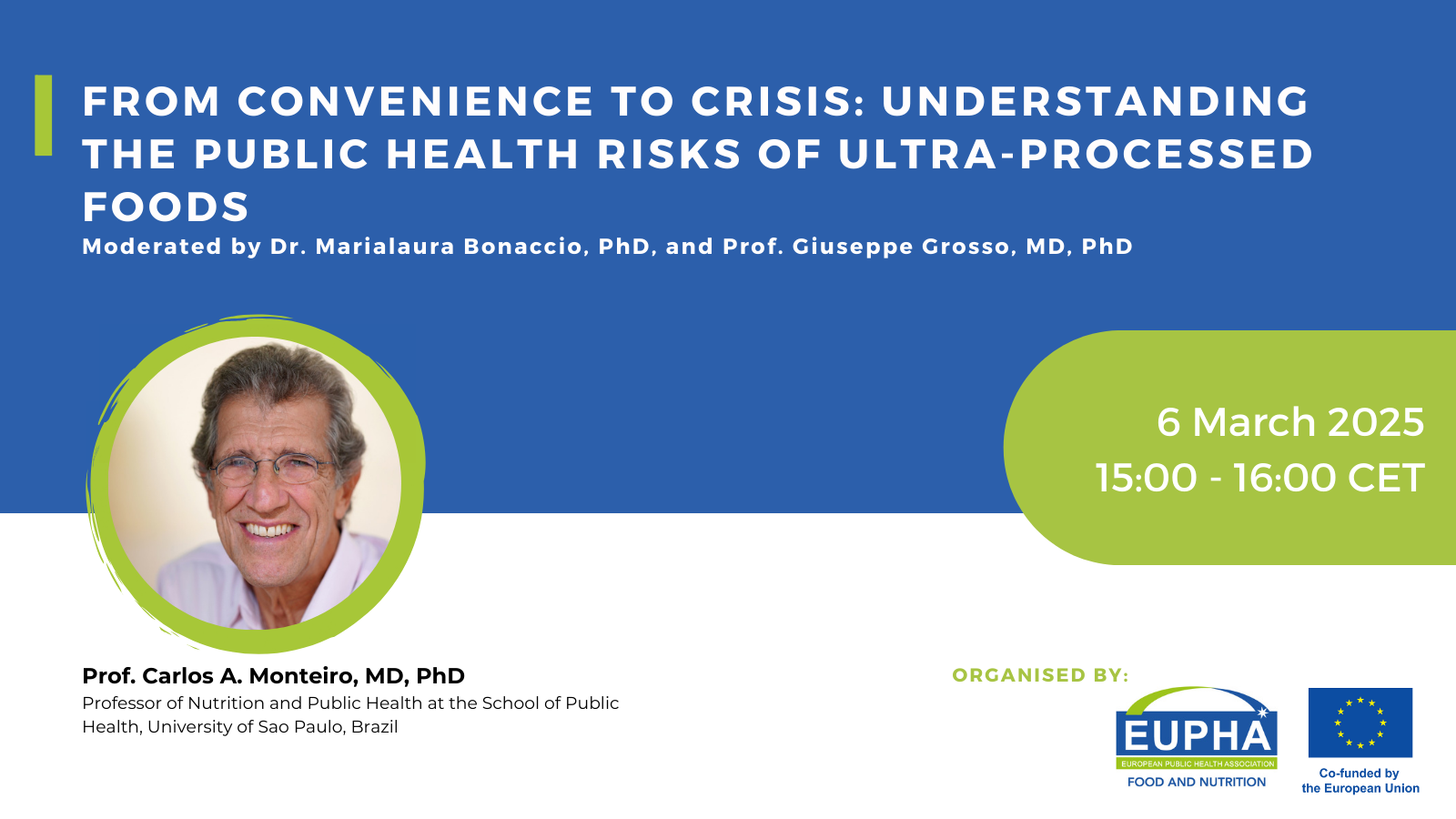
Professor Monteiro’s lecture will define the ultra-processed dietary pattern, examine the available evidence linking this pattern to the obesity pandemic, and consider policy implications.
Shaping the Future of Inflammatory Bowel Disease: A Global Research Agenda for Better Management and Public Health Response
February 27, 2025 / 16:00-17:00 CET
Organised by: EUPHA Chronic diseases section
Speaker: Dr. Virginia Solitano, Division of Gastroenterology and Gastrointestinal Endoscopy, IRCCS Ospedale San Raffaele, University Vita-Salute San Raffaele, Milan, Italy and the Departments of Medicine, Epidemiology and Biostatistics, Western University, London, Ontario, Canada.
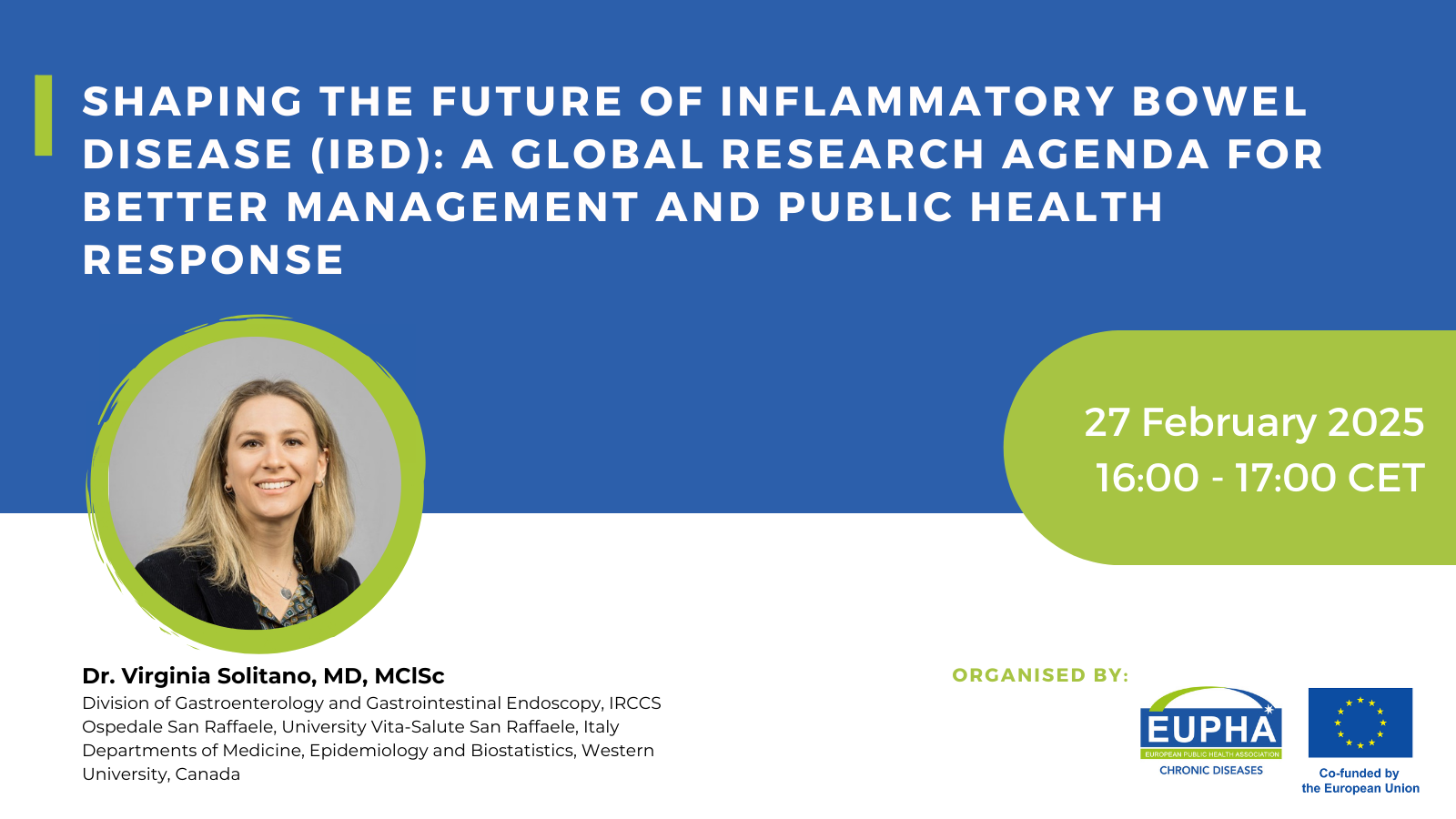
Inflammatory Bowel Disease (IBD) is a growing global health challenge affecting over 7 million people worldwide. With increasing prevalence across all age groups, including children and adolescents, IBD places substantial strain on healthcare systems and societies, resulting in high direct medical costs, lost productivity, and reduced quality of life. Despite advances in therapeutic options, suboptimal disease control and delays in timely diagnosis and adequate treatment persist. Regional disparities in healthcare access contribute to these challenges, especially in developing countries. Addressing these inequities is crucial for improving global IBD outcomes. Using a Delphi methodology, experts from clinical care, research, public health, and advocacy identified priorities across six domains: epidemiology, care models, treatment strategies, education and awareness, patient and community engagement, and leadership to promote health equity. These priorities emphasize quantifying the burden of IBD, addressing healthcare disparities, validating care models, exploring novel treatments, advancing education, engaging patients, and advocating for health equity policies. The comprehensive approach seeks to optimize care models, promote patient engagement, and ensure equitable access to healthcare. The identified priorities serve as a guide for both clinical and non-clinical researchers and funders dedicated to IBD-related initiatives, fostering international collaboration to improve IBD management and reduce its impact globally.
Rural Health Promotion
February 26, 2025 / 10:00-11:00 CET
Organised by: EUPHA Health promotion section
Speakers:
- Professor Eric Breton, EHESP School of Public Health and President of the Eupha Health Promotion Section
- Professor Geir Arild Espnes, NTNU Centre for Health Promotion Research
- Professor Camilla Ihlebæk, Department of Public Health Science, Norwegian University of Life Sciences
- Dr Petra Plunger MPH, Competence Center Future Health Promotion, Austrian National Public Health Institute
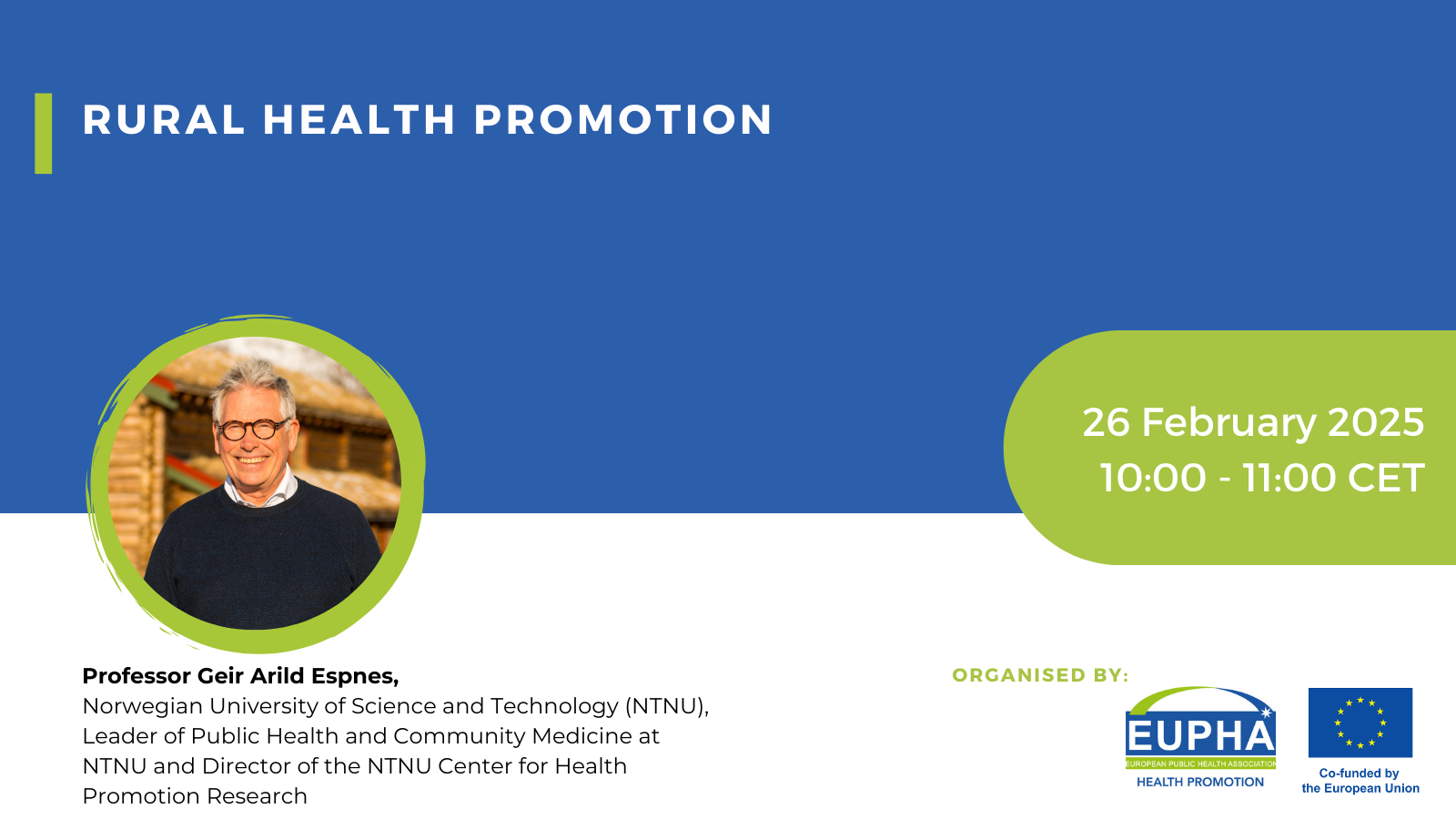
Rural communities face unique public health challenges—but also opportunities. This webinar, led by Professor Geir Arild Espnes (NTNU Centre for Health Promotion Research), will explore health promotion policies, programs, and research tailored to rural Europe.
- Learn about the latest in rural health promotion
- Connect with experts and peers
- Get involved in the EUPHA rural health working group
In recent years, it has become increasingly evident that rural Europe faces unique public health challenges compared to urban areas. Rural health promotion refers to a branch of public health that focuses on the unique health needs and challenges, but also positive impacts faced by populations living in rural areas. It involves the development, implementation, and evaluation of health programs and policies tailored to address the specific characteristics of rural communities, including geographic, social, economic, and cultural factors.
Join us for a conversation on health promotion policy, programme and research of rural settings in Europe. This webinar is hosted by Professor Geir Arild Espnes, Director of NTNU Centre for Health Promotion Research and leader of the EUPHA Health Promotion Section working group on rural health promotion. He, with other colleagues, will provide an overview of the field and present the working group. The webinar will be very interactive and participants interested in joining this task force are invited to make themselves known.
Impact of Digital Interventions in the prevention, management and treatment of Non-Communicable Diseases - being in touch with the present and looking towards the future
January 30, 2025 / 16:00-17:00 CET
Organised by: EUPHA Chronic diseases section
Speaker: Dr. Stefan Buttigieg MD MSPH MSc, Vice-President of the EUPHA Digital health and
artificial intelligence section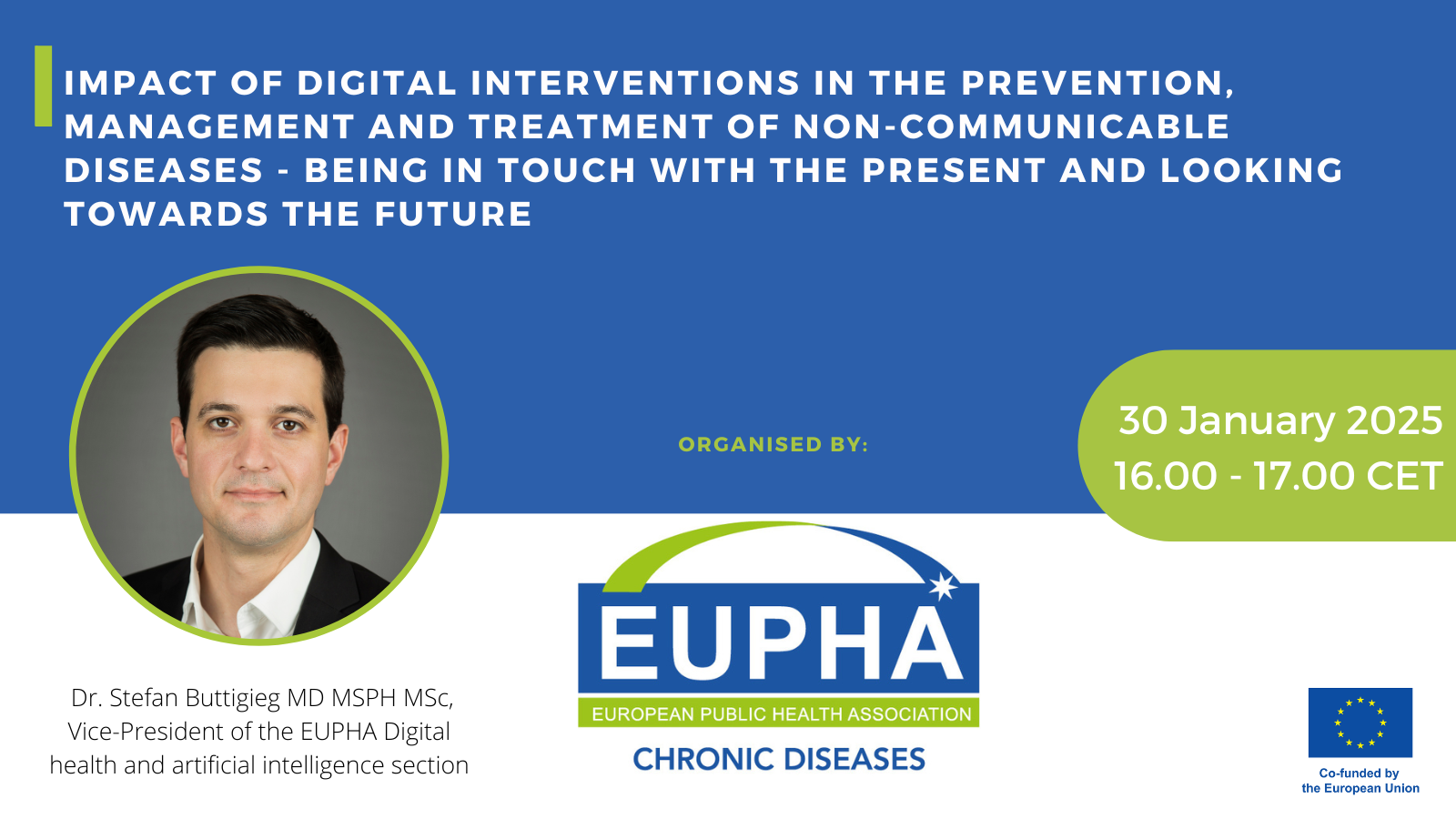
Non-communicable diseases (NCDs) remain a leading cause of mortality and morbidity worldwide, posing significant challenges to health systems and economies. Digital interventions are increasingly recognized as transformative tools in addressing these challenges, enabling innovative prevention, management, and treatment strategies.
This webinar explores the profound impact of digital health technologies in combating NCDs, with a dual focus on present applications and future potential. We will examine how solutions such as mobile health apps, digital therapeutics, wearable devices, telemedicine, and artificial intelligence are empowering individuals, enhancing health system efficiency, and driving data-informed decision-making.
Highlighting case studies and cutting-edge research, the session will delve into the effectiveness of these interventions across diverse settings, from empowering behavior change to enabling precision medicine. In looking forward, we will discuss emerging trends, including digital therapeutics, integrated ecosystems, and the ethical considerations in deploying these solutions at scale.
Join us as we navigate the evolving landscape of digital health and its role in shaping a healthier, more connected future for NCD prevention and care.
Training session on EU Grant preparation
January 27, 2025
Organised by: EUPHA Health services research section, EUPHAnxt, EUPHA
Speaker: Johan Hansen (EUPHA Section HSR) & Monica-Georgiana Brînzac (on behalf of EUPHAnxt)
The webinar is set up as opportunity to become more familiar with EU funding programmes, including elements to consider when identifying and interpreting call topics, how to join and build a consortium and how to write and submit a proposal. It was open to all interested audiences, and in particular those who are relatively new to recent EU funding instruments.
Professional development in Health Promotion: A look at health promotion study programmes in Europe
December 13, 2024 / 13:30-14:30 CET
Organised by: EUPHA Health promotion section
The webinar is organised by Karina Leksy (Poland), Kevin Dadaczynski (Germany), and Monica O'Mullane (Ireland) members of the HP Section Steering Committee who will have different speakers sharing their experience. A nice opportunity to get a sense of current trends in Europe.
Moderator/Chair: Prof. Kevin Dadaczynski
Speakers:
- Louise Potvin, University of Montreal
- Verena Biehl, ZHAW Zurich University of Applied Sciences, Switzerland
- Kevin Dadaczynski, Fulda University of Applied Sciences, Germany
- Monica O'Mullane, University College Cork, Ireland
Download the programme here.
Global Network for Health in All Policies (GNHiAP)
November 29, 2024 / 14:00-15:30 CET
Organised by: GNHiAP and EUPHA
Presenters:
- Charlotte Marchandise-Franquet, Director, European Public Health Association (EUPHA)
- Horacio Arruda, Assistant Deputy Minister- Mandates in Public Health Prevention, Promotion, Planning and Protection, ministère de la Santé et des Services sociaux du Québec and Chairman of the GNHiAP
- Nicole Valentine, Program Manager and Technical Officer, World Health Organization
- Julian Fisher, Director, Zero Water Day Partnership
- Timo Ståhl, THL National Institute of Public Health
- Peter Beznec, Director, Centre for Health and development Murska Sobota
- Lauri Kokkinen, Co-leader, WHO Collaborating Centre on Health in All Policies and the Social Determinants of Health, Tampere University, Finland
Governments and societies face complex social, political, economic, and environmental crises that affect health and sustainable development. Approaches to address these challenges call for united and cross-sector approaches. The Health in All Policies approach (HiAP) seeks to integrate health and equity considerations across every level of government, fostering a shared responsibility for population health and a coordinated approach to addressing the environmental and social determinants of health.
This webinar is a unique opportunity to learn about HiAP and its core pillars, hear about real-world examples, explore its growing relevance in Europe and how we can tackle these crises in a unified and inclusive way, one which contributes to sustainable development.
The session is jointly organized by the Global Network for Health in All Policies (GNHiAP) and the European Public Health Association (EUPHA), as part of a strategic initiative leading up to the 2025 European Public Health Conference and encourage the adoption of HiAP across the European region.
Click here for the programme.
Team-based care for the management of chronic diseases: from evidence to implementation
November 28, 2024 / 16:00-17:00 CET
Organised by: EUPHA Chronic diseases section
Presenters: Dr Viktoria Gastens, PharmD PhD, Population Health Laboratory (#PopHealthLab), University of Fribourg, Switzerland, and Professor Valérie Santschi, PharmD PhD, La Source, School of Nursing Sciences, HES-SO University of Applied Sciences and Arts Western Switzerland
Bio: Dr Viktoria Gastens is a Postdoctoral Researcher at the Population Health Laboratory (#PopHealthLab) at the University of Fribourg and a practicing Community Pharmacist. Prof. Valérie Santschi, pharmacist, PhD, is Full Professor of Health Services and Head of the LAB-Teaching and Research Healthcare Systems, Ethics, Interprofessional Practice (SEI LAB) at the School of Nursing Sciences La Source, HES-SO University of Applied Sciences and Arts Western Switzerland in Lausanne. Dr Gastens and Prof. Santschi are collaborating on health services research including systematic reviews with meta-analyses.
Summary: Due to ageing populations, busy clinical workloads and, shortage of physicians in most healthcare systems, innovative models of care with a focus on team-based care (TBC), involving pharmacists or nurses could be a promising approach in improving the management of chronic diseases. In this webinar, we will discuss some results from our research using a recent evidence of TBC and pharmacist care in hypertension management.
Developing a Practical Framework to Support the Timely and Effective Design and Implementation of Complex and Technology-Supported Interventions (the GERONTE Intervention)
October 31, 2024 / 16:00-17:00 CET
Organised by: EUPHA Chronic diseases section
Presenter: Bridget O'Sullivan, MSc. Nursing, PG Health Protection, PG Dip. Perioperative Nursing, PG. Cert. Cardiovascular Health, BSc. Nursing, Diploma Nursing
The need to accelerate prevention and control of chronic diseases in Central Asia
September 26, 2024 / 16:00-17:00 CEST
Organised by: EUPHA Chronic diseases section
Presenter: Antonio Sarría-Santamera, MBBS PhD, Medicine & Global Health, Nazarbayev University School of Medicine, Kazakhstan
Central Asia is an immense territory although relatively sparsely populated, with an increasing tendency for urbanization. Despite being relatively young populations, Central Asian countries suffer a tremendous burden due to NCDs significantly higher compared to European levels. Premature mortality is a significant factor, with the highest rates observed in men. Cardiovascular disease ranks as the primary cause of death, followed by oncological and digestive system disorders. Several factors contribute to this high rate of premature mortality, including excessive alcohol consumption, smoking, and an unhealthy diet. Poor control of glucose levels, blood pressure, or dyslipidemia further contributes to premature mortality from conditions like ischemic heart disease, stroke, and hypertensive heart disease. Public health authorities are making efforts to improve control of NC, but still health promotion or appropriate detection and treatment are suboptimal, at best, and usually are lacking. The webinar will discuss the problems with NCD in Central Asian countries.
The state of Health Promotion Practice and Research in Europe
June 25, 2024 / 11:30-12:30 CEST
Organised by: EUPHA Health promotion section
Health promotion is a very broad field that is not always well understood within the wider EUPHA community. The webinar is organised by section steering committee member Elisabeth Noehammer from the Department of Public Health, Health Services Research and Health Technology Assessment in Austria. The webinar will highlight the state of health promotion practice in Europe. The presentations will cover the strengths and weaknesses of 4 countries and the challenges they face and leave room for discussions. This collection of perspectives will be of high interest not only for those experienced in health promotion, but also for new colleagues who may still be wondering what they signed for.
Speakers:
- Petra Plunger and Anna-Kristina Wahl on Austria
- Eric Breton on France
- Niko Kohls on Germany
- Heike Wieser on Italy
- Karina Leksy on Poland
Global healthcare labour markets and mobile workforces
June 17, 2024
Organised by: EUPHA Health and care workforce section
Chairs: Ellen Kuhlmann, IWAK, Goethe-University Frankfurt, Germany and Marius Ungureanu, Department of Public Health Babeș-Bolyai University, Cluj-Napoca, Romania
Key questions:
- What are the major challenges to the governance of global health labour markets and mobile healthcare workers?
- How to develop more equitable and effective healthcare workforce migration policy and how to improve its implementation?
This is webinar 4 of a series of 4 themed The workforce crisis in healthcare: moving the debate to bridge evidence and policy. This webinar series aims to advance the healthcare workforce debate by directing its attention to the implementation of policy recommendations and identifying weaknesses, highlighting a wide range of healthcare workforce policies and interventions across various countries. It results of a combined effort by the International Journal of Health Planning and Management, the WHO Collaboration Center for Healthcare Workforce Policies and Planning / NOVA-Institute of Hygiene and Tropical Medicine (to be confirmed), and the EUPHA section Health Workforce Research. The series is organised by Ellen Kuhlmann, Gabriela Lotta and Tiago Correia and draws on a special issue of the International Journal of Health Planning and Management, 2024, 39(3), that will be published in May.
Re-visioning the governance and organisation of healthcare work: skill-mix, leadership, and new professional groups
June 11, 2024
Organised by: EUPHA Health and care workforce section
Chairs: Tiago Correia, WHO Collaborating Center for Health Workforce Policy and Planning. Lisbon, Portugal and co-chair
Key questions:
- How to improve the organisation and management and the composition of the healthcare workforce?
- What policy responses are needed to achieve this vision of a more effective and resilient future healthcare workforce and how to improve the implementation?
This is webinar 3 of a series of 4 themed The workforce crisis in healthcare: moving the debate to bridge evidence and policy. This webinar series aims to advance the healthcare workforce debate by directing its attention to the implementation of policy recommendations and identifying weaknesses, highlighting a wide range of healthcare workforce policies and interventions across various countries. It results of a combined effort by the International Journal of Health Planning and Management, the WHO Collaboration Center for Healthcare Workforce Policies and Planning / NOVA-Institute of Hygiene and Tropical Medicine (to be confirmed), and the EUPHA section Health Workforce Research. The series is organised by Ellen Kuhlmann, Gabriela Lotta and Tiago Correia and draws on a special issue of the International Journal of Health Planning and Management, 2024, 39(3), that will be published in May.
The ‘permacrises’ and its exacerbating effects of the healthcare workforce crisiss
June 7, 2024
Organised by: EUPHA Health and care workforce section
Chairs: Tiago Correia, WHO Collaborating Center for Health Workforce Policy and Planning, Lisbon, Portugal and Gabriela Lotta, Getulio Vargas Foundation, Sao Paulo, Brazil
Key questions:
- What are the major challenges to the healthcare workforce?
- What policies are needed to respond effectively to the problems and how to improve implementation?
This is webinar 2 of a series of 4 themed The workforce crisis in healthcare: moving the debate to bridge evidence and policy. This webinar series aims to advance the healthcare workforce debate by directing its attention to the implementation of policy recommendations and identifying weaknesses, highlighting a wide range of healthcare workforce policies and interventions across various countries. It results of a combined effort by the International Journal of Health Planning and Management, the WHO Collaboration Center for Healthcare Workforce Policies and Planning / NOVA-Institute of Hygiene and Tropical Medicine (to be confirmed), and the EUPHA section Health Workforce Research. The series is organised by Ellen Kuhlmann, Gabriela Lotta and Tiago Correia and draws on a special issue of the International Journal of Health Planning and Management, 2024, 39(3), that will be published in May.
Burden of Chronic Diseases from a small country perspective
May 30, 2024
Organised by: EUPHA Chronic diseases section
Presenter: Dr. Sarah Cuschieri MD, PhD, University of Malta, Adjunct research professor Epidemiology and Biostatistics Department, Western University, London, Ontario, Canada
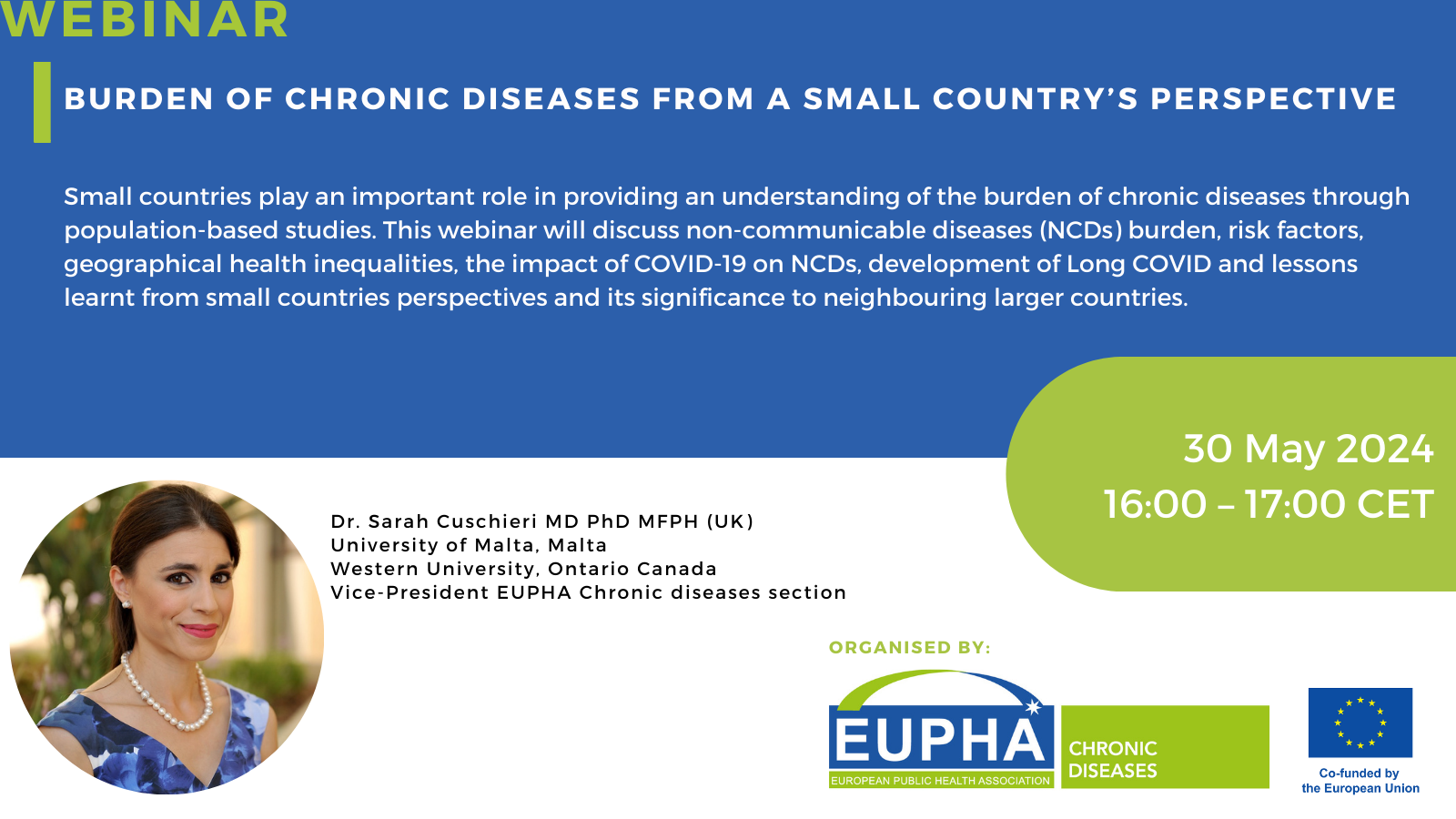
Small countries play an important role in providing an understanding of the burden of chronic diseases through population-based studies. This webinar will discuss non-communicable diseases (NCDs) burden, risk factors, geographical health inequalities, the impact of COVID-19 on NCDs, development of Long COVID and lessons learnt from small countries perspectives and its significance to neighbouring larger countries.
How to respond more effectively to the healthcare workforce crisis: international evidence and national exampless
May 29, 2024
Organised by: EUPHA Health and care workforce section
Presenters: Julia Zimmermann, Marina Karanikolos (European Observatory on Health Systems and Policies)
Chairs: Ellen Kuhlmann, IWAK, Goethe-University Frankfurt, Germany and Tiago Correia, WHO Collaborating Center for Health Workforce Policy and Planning, Lisbon, Portugal
Key questions to be discussed with the panellists and participants:
- What are the most effective policy responses to the healthcare workforce crisis, related to your research topic?
- How to improve evidence-based healthcare workforce policy and its implementation?
This is webinar 1 of a series of 4 themed The workforce crisis in healthcare: moving the debate to bridge evidence and policy. This webinar series aims to advance the healthcare workforce debate by directing its attention to the implementation of policy recommendations and identifying weaknesses, highlighting a wide range of healthcare workforce policies and interventions across various countries. It results of a combined effort by the International Journal of Health Planning and Management, the WHO Collaboration Center for Healthcare Workforce Policies and Planning / NOVA-Institute of Hygiene and Tropical Medicine (to be confirmed), and the EUPHA section Health Workforce Research. The series is organised by Ellen Kuhlmann, Gabriela Lotta and Tiago Correia and draws on a special issue of the International Journal of Health Planning and Management, 2024, 39(3), that will be published in May.
Health systems Resilience testing: using shock scenarios to develop actionable policies
May 17, 2024
Organised by: EUPHA Foresight section
Presenters: Julia Zimmermann, Marina Karanikolos (European Observatory on Health Systems and Policies)
Recent adverse events, including the COVID-19 pandemic, extreme weather, war, and economic crises have demonstrated that many health systems are not sufficiently resilient. The resilience testing methodology is a mixed methods approach that uses a hypothetical shock scenario to help health systems understand their strengths and weaknesses. This helps health systems develop responses to improve their resilience. This webinar is a deep dive on the resilience testing methodology. We will convey core concepts of this new approach and discuss practicable insights from its implementation.
Surveillance bias of Cancer
April 25, 2024
Organised by: EUPHA Chronic diseases section
Presenters: Dr Stefano Tancredi, MD, and Prof Arnaud Chiolero, MD PhD, Population Health Laboratory, University of Fribourg, Switzerland
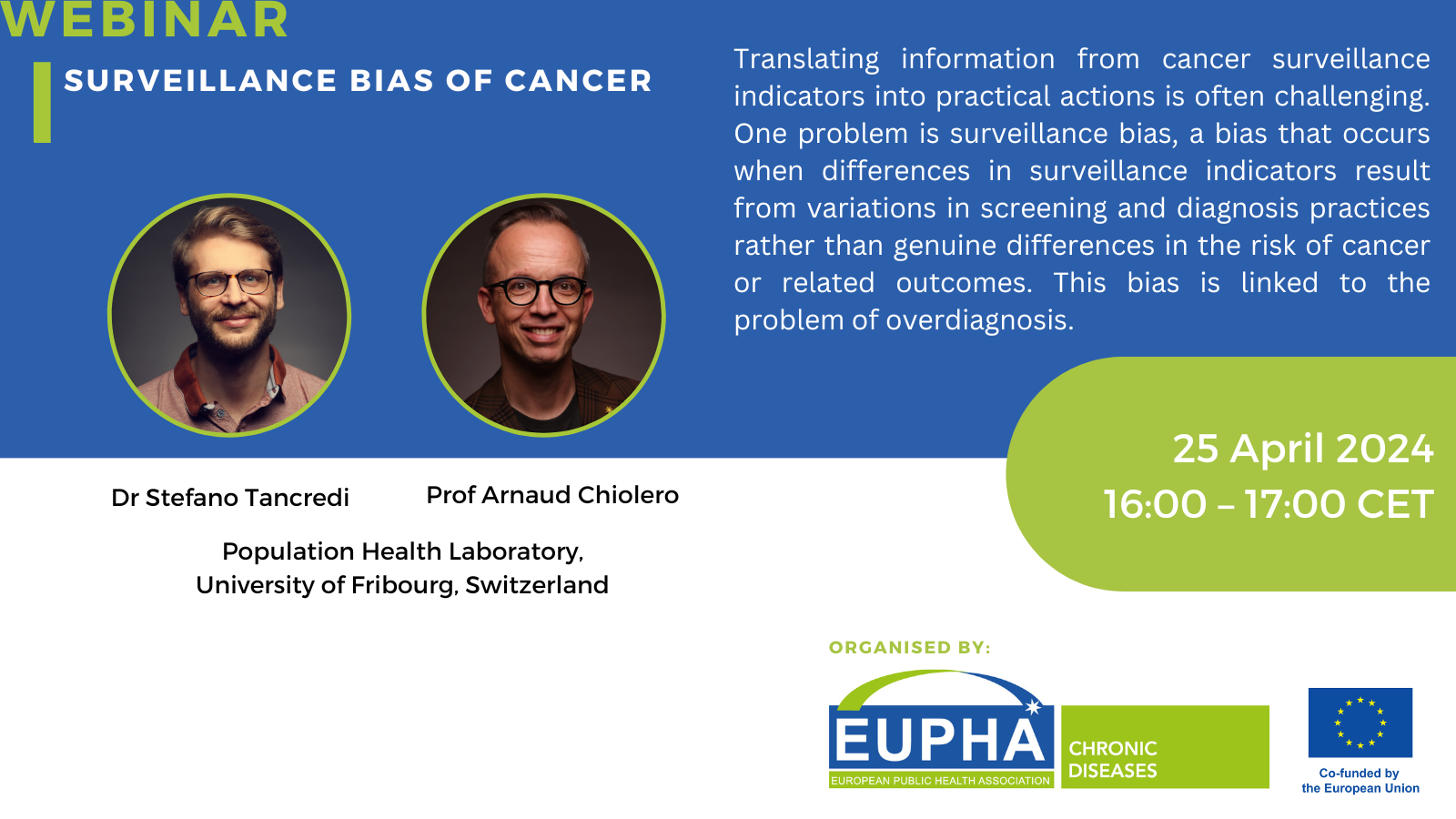
Translating information from cancer surveillance indicators into practical actions is often challenging. One problem is surveillance bias, a bias that occurs when differences in surveillance indicators result from variations in screening and diagnosis practices rather than genuine differences in the risk of cancer or related outcomes. This bias is linked to the problem of overdiagnosis. In this webinar, we will illustrate the issue of surveillance bias of cancer using multiple examples and suggest potential approaches to address it.
Presenters’ Information: Dr. Stefano Tancredi, MD, and Prof. Arnaud Chiolero, MD, PhD, conduct epidemiological research on chronic diseases at the #PopHealthLab of the University of Fribourg, Switzerland. Stefano Tancredi is a PhD student at the #PopHealthLab. Prof. Chiolero is Full Professor of Public Health at the University of Fribourg, Adjunct Professor at the University of Berne, and Adjunct Professor in the School of Global and Population Health of McGill University.
How are tobacco companies circumventing tobacco control legislation in Israel?
March 28, 2024
Organised by: EUPHA Chronic diseases section
Presenter: Dr. Yael Bar-Zeev, MD, MPH, PhD Hebrew University of Jerusalem
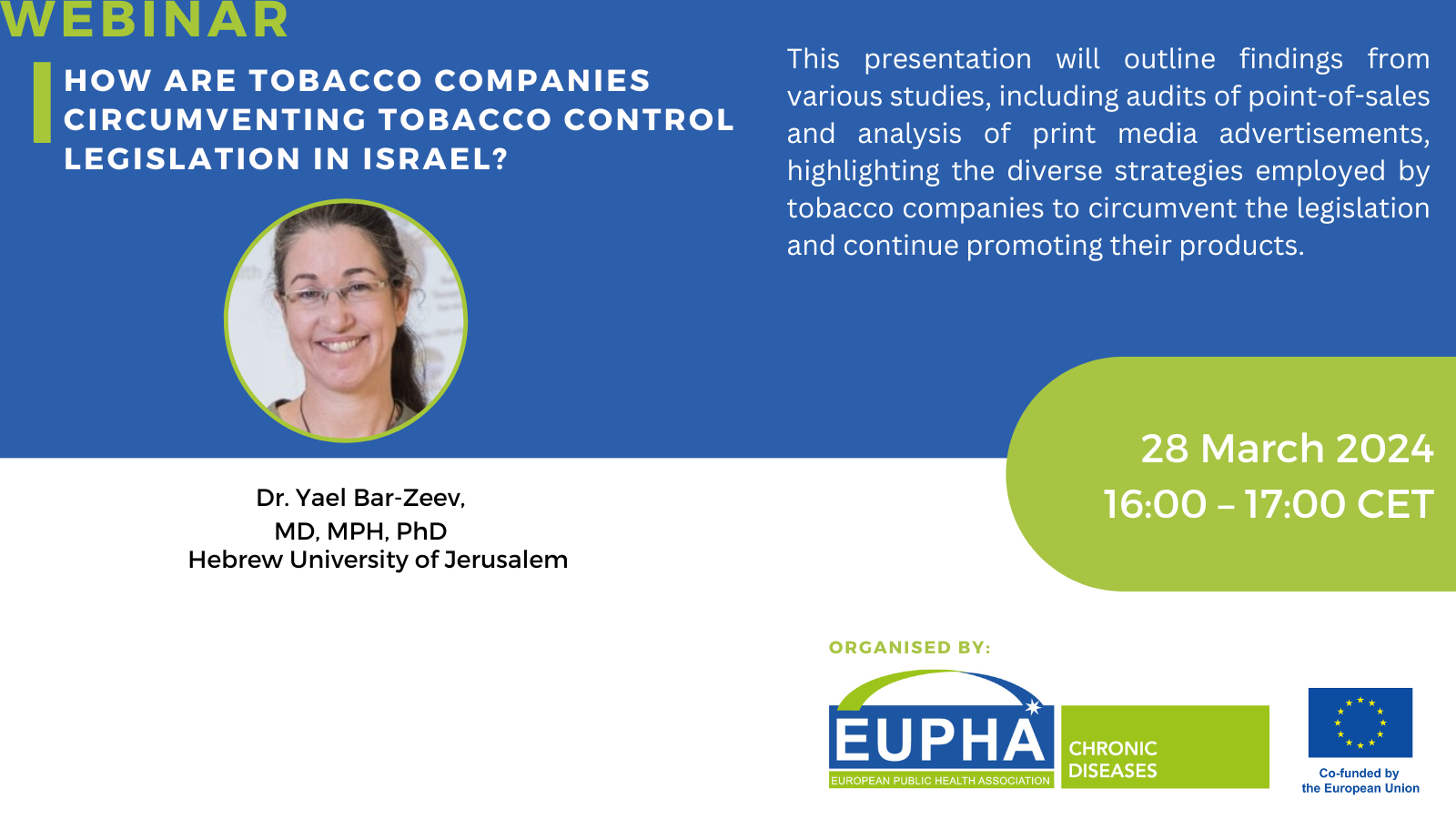
In the 2019-2020 period, Israel introduced comprehensive tobacco control measures, such as prohibiting advertisements (except in print media), mandating plain packaging with prominent health warnings, and banning point-of-sale displays. Notably, Israel extended these regulations to encompass all tobacco and nicotine products, pioneering plain packaging for electronic cigarettes. This presentation will outline findings from various studies, including audits of point-of-sales and analysis of print media advertisements, highlighting the diverse strategies employed by tobacco companies to circumvent the legislation and continue promoting their products
Fourth in-between seminar of the EUPHA Social security, work and health section
March 19, 2024
Organised by: EUPHA Social security, work and health section
At this digital seminar we will aim to showcase the range of research going on within the research field by letting a number of young researchers present their projects. We will also allow plenty of time for questions and discussions.
Click on the link here
Meeting ID: 941 4980 2836
Access code: 784012
René de Vries, PhD student, University Medical Center Groningen, The Netherlands
The long arm of adversity. An epidemiological study on childhood adversity, adolescent psychopathology and labour market outcomes in young adulthood’
Ida Karlsson, PhD student, Karolinska Institute, Sweden
Evaluation of a problem-solving intervention with workplace involvement in primary health care, for employees on sickness absence due to common mental disorders – a cluster randomized controlled trial.
Marije Hagendijk, PhD student, Amsterdam University Medical Center, The Netherlands
Value@WORK: value-based healthcare in work-focused healthcare
Anna-Maria Hultén, Postdoc, Gothenburg University, Sweden
Early identification of primary health care patients at risk of sick leave due to work-related stress. A situated understanding.
ECDC scenario's for 2040
March 1, 2024
Organised by: EUPHA Foresight section
Presenter: Gerjon Ikink, Principal Expert Public Health Foresight and Determinants, European Centre for Disease Prevention and Control (ECDC)
Six future scenarios were developed as a foundational element of the ECDC Foresight Programme. The scenarios feature the possible threat landscapes for ECDC’s mission and operations in 2040. We have since revised and refined the scenarios and then done a ‘backcasting’ from these scenarios from 2040 to the present, as well as desk research, to identify steps and actions to be taken so that ECDC would still be effective in each of these scenarios. Based on this, a list of possible policy and strategy options have been identified for ECDC to prepare for and respond to the emerging situations under each scenario.
A national and sub-national analysis of diabetes mellitus prevalence and health inequalities in Europe
February 29, 2024
Organised by: EUPHA Chronic diseases section
Presenters:
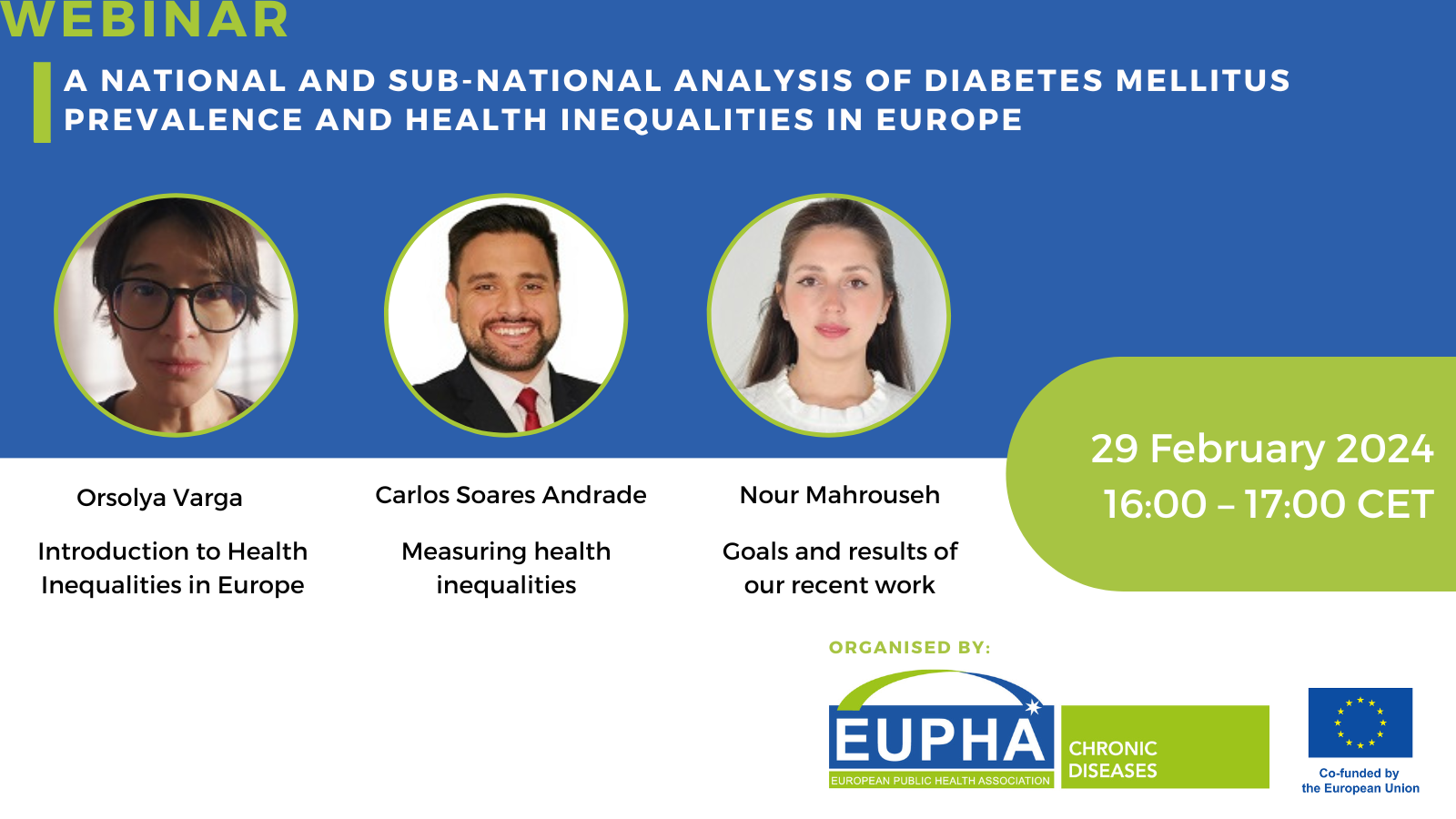
- Orsolya Varga, Department of Public Health and Epidemiology, Faculty of Medicine, University of Debrecen; Syreon Research Institute, Budapest
- Nour Mahrouseh, Department of Public Health and Epidemiology, Faculty of Medicine, University of Debrecen
- Carlos Alexandre Soares Andrade, Department of Public Health and Epidemiology, Faculty of Medicine, University of Debrecen
More information here
Right to health, public health and climate change
February 20, 2024
Organised by: UK Faculty of Public Health, United Nations Human Rights, Global Network for Academic Public Health, ASPHER, EUPHA-LAW

Climate change is a public health emergency. It is the single biggest threat to global health, peace, and security, a crisis multiplier, and a significant driver of health inequalities. Human right-based approaches are essential for good public health policies and practice, including action to address climate change.
This webinar is the first in a series offered by the Faculty of Public Health (UK), UN Office of the High Commissioner for Human Rights (OHCHR), Geneva, Global Network for Academic Public Health (GNAPH), Groningen Centre for Health Law, EUPHA and other partners to build understanding, competence and capacity on human rights-based approaches for good public health policy and practice.
The session will include presentation by Alicia El Yamin, distinguished scholar, author and advocate from Harvard University, with Maja Groff, international lawyer based in the Hague and Convenor, Climate Governance Commission , Marlies Hesselman, from the University of Groningen Centre for Law, and Benjamin Schachter, Human rights Officer at OCHR, as discussants and Panelists.
Future proofiing the EU AMR Action plan – Applying futures methods to complex public health challenges
January 26, 2024
Organised by: EUPHA Foresight section
Presented by: Sarah Parkinson, RAND Europe
Antimicrobial resistance (AMR) is a serious public health concern and has been deemed a top priority amongst public health authorities internationally. In 2017, the European Commission published the European One Health Action Plan against AMR, which set out objectives and priory areas for actions across EU/EEA Member States. In this webinar, we will present a future-proofing study of the Action Plan. This study included developing a series of scenarios for how AMR might develop over the next ten years, in order to gather stakeholder perspectives on how the Plan can be improved to mitigate against future risks, take advantage of future opportunities and move towards more favourable futures. This webinar will focus on both how future methodologies can be applied to think through complex public health challenges, and on the results of the study.
Epidemiology and Prevention of Chronic Disease: Global Public Health Perspectives
January 25, 2024
Organised by: EUPHA Chronic diseases section
Presenter: Prof. Saverio Stranges, MD, PhD, FAHA
This webinar will provide a global overview on the epidemiology and prevention of chronic disease, with focus on cardio-metabolic conditions and multimorbidity, as well as on the role of lifestyles and social determinants of health. It will focus on examples of Dr Stranges’s own research in this field. Specific topics will be: (1) the role of traditional and emerging risk factors; (2) the importance of socio-environmental determinants of health and their impact on chronic disease in both high-income countries and low-resource settings; (3) the need for enhanced partnership between primary care & public health; (4) current & future public health challenges and opportunities in chronic disease prevention and management.
Click for the slides part 1 and part 2.
EUPHA Global health initiative/section AMR Webinar series
January 24, 2024 - 14:00-15:00 CET
Organised by: EUPHA Global health section
Presenter: Liz Taylor, WHO
The EUPHA Global Health section-initiative is pleased to announce the first of what will be a series of webinars about Antimicrobial Resistance (AMR) in 2024.
Dr Liz Tayler from the World Health Organization (WHO) will be our guest presenter for the first webinar. Dr Tayler will discuss the important topic of AMR, a global health issue that affects the effectiveness of antibiotics and other antimicrobial drugs. Dr Tayler will share valuable insights and updates on the current state of AMR and its impact on global health. Don't miss this opportunity to learn from an expert in the field and engage in a thought-provoking discussion.
Dr Tayler works for WHO supporting Egypt and countries in the WHO Regional Office for the Eastern Mediterranean (EMRO) to scale up action on Infection Prevention and Control (IPC) and AMR. Liz previously worked on AMR in WHO Geneva for seven years, where she led the team supporting National Action plans, the establishment of the AMR Multi-Partner Trust Fund and the Quadripartite Strategic Framework for AMR, and developed the Tripartite AMR country self-assessment survey (TrACCS), and AMR monitoring framework.
Webinar on Global Health
December 12, 2023
Organised by: EPH Lisbon host
Moderator:
Sonia Dias, chair of the International Scientific Committee Lisbon 2024
Speakers:
Ilona Kickbusch, Founder and Chair of the Global Health Centre at the Graduate Institute of International and Development Studies in Geneva, Switzerland
Magda Robalo, former Minister of Health Guinea Bissau, Institute for Global Health and Development (IGHD), Guinea Bissau
Elena Petelos, Senior Research Fellow in Public Health, University of Crete, Greece, and Maastricht University, Netherlands, President EUPHA Global health section
Here is the video of the first session.
They shared profound insights drawn from their extensive expertise in public health, epidemiology, and healthcare management. Join us in shaping impactful conversations around global health challenges and solutions, exploring innovative approaches for a healthier, more equitable world. Don't miss this opportunity to contribute to meaningful change!
Beyond the Present: Utilising the Wellbeing of Future Generations Act to address health inequalities in Wales
November 24, 2023
Organised by: EUPHA Foresight section
Sara Elias from the Future Generations Commissioner of Wales presented the webinar.
WHO Global Health Foresight: looking forward to best harness the power of science and research
September 22, 2023
Organised by: EUPHA Foresight section
Presented by Marion Laumonier and Anna Laura Ross, from the World Health Organization.
This webinar will focus on the monitoring of scientific advances with a global health perspective.
The Ghosts of Christmas - Stories on Foresight
June 16, 2023
Organised by: EUPHA Foresight section
Presented by Dr Artur Furtado, Head of the Disease Prevention and Health Promotion unit of the European Commission.
Evidence-Based Public Health: The Contentious Interface Between Evidence and Public Health
May 8, 2023
Organised by: EUPHA Public health epidemiology section, Stanford University, METRICS, Universita Cattolica sel Sacro Cuore
Webinar powered by: EUPHA
The EUPHA Public health epidemiology secion (EUPHA-EPI) is pleased to invite you to this webinar on evidence-based public health with Professor John Ioannidis, from Stanford University.

This webinar is aimed at exposing the European public health epidemiology community to the crucial role of evidence to guide public health for both chronic problems and acute crisis circumstances. Dr. Ioannidis will address the significance of valid data generation, collection, and interpretation, with examples from both chronic diseases and challenges encountered during the COVID-19 pandemic. The discussion will emphasize the vital function of public health epidemiologists in generating and using reliable, transparent, reproducible evidence, shaping policy decisions.
More information here.
30 years of the Dutch Public Health Foresight Study– Lessons Learnt
April 14, 2023
Organised by: Dr Henk Hilderink, EUPHA Foresight section president
This Webinar will present experiences and lessons learnt of foresight studies implemented in the Netherlands over the last 30 years.
Modelling healthcare expenditure by disease in OECD countries
March 30, 2023
Organised by: OECD and EUPHA Public health economics section
During the virtual seminar, we will discuss two recent works on attributing healthcare expenditures to diseases. A specific focus of the discussion will be on the methodological challenges and the policy implications of such cost-of-illness analyses for OECD countries. The University of Melbourne will present a country-level model that has been used in a simulation study achieving SDG 3.4. The OECD Secretariat will outline an AI-based model relying on patient-level data that is used in the OECD microsimulation model for Strategic Public Health Planning for non-communicable diseases (SPHeP-NCD) to assess the cost-effectiveness of prevention interventions. The Secretariats will also discuss the benefits of this project to policymakers and information on how countries can get involved.
Attendees will have the opportunity to discuss both methodologies and real-world applications and exchange views with academics part of the EUPHA.
More information here.
International Women’s Day - Health policy and global health crises: why we need feminist intersectional approaches and what to learn from COVID-19?
March 7, 2023
Organised by: EUPHA-HWR, EUPHA-PHPP, EUPHA-SGMH, EUPHA-MIG, EUPHA Working Group on SDG5, EUPHAnxt
Webinar powered by: EUPHA
We invite you to join us in celebrating (the evening before) 8 March International Women’s Day and critically reflect on the lessons to be learned from the COVID-19 pandemic. An international group of speakers seeks to highlight policy gaps and discuss how gender inequalities exacerbated in the shadow of a major global health crisis and how they intersect with other inequalities and new migration flows. Why did health policy failed so badly to protect women, minorities, and vulnerable groups, and what role did public health play? The webinar seeks to explore ways to create a ‘new normal’ that is better equipped to protects human rights, equality and equality, and the crucial role of feminist networks and research.
Find more information here.
Virtual round table on women's rights and human rights
March 8, 2023
Organised by: EUPHAnxt, EUPHA working group on SDG5 and others
Find more information here.
Stepping up the Prevention of Violence Against Healthcare Workers
March 13, 2023
Organised by: EHMA and EUPHA-HWR
This webinar is a call for unity and mobilisation, and to explore opportunities to better address the prese